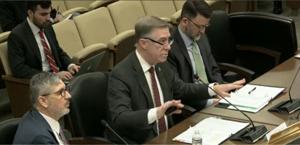(The Center Square) – Twenty-four Republican governors have responded to Texas Gov. Greg Abbott’s call for help to secure its border with Mexico.
“The federal government’s response handling the expiration of Title 42 has represented a complete failure of the Biden Administration,” the governors said in a joint statement, referring to the end of the public health authority, Title 42, which expired at midnight on May 11.
Title 42 allowed for the quick expulsion of foreign nationals who’d entered the U.S. illegally during the COVID-19 pandemic. With its end, an estimated 150,000 foreign nationals from all over the world are waiting in Mexico to illegally enter the U.S. at any moment, border officials say.
This is after at least more than 7 million people have been apprehended or reported evading capture by law enforcement since President Joe Biden’s been in office.
The Biden administration recently sent 1,500 military personnel to the border and the U.S. Department of Homeland Security sent several thousand federal employees to help Border Patrol agents expedite processing of foreign nationals into the U.S., not to block their entry, administration officials have explained.
While doing so, the president and DHS Secretary Alejandro Mayorkas continue to argue the border is closed.
Within the past few days, groups of tens of thousands of foreign nationals arrived in the Rio Grande Valley and in other areas of Texas, overwhelming Border Patrol agents, officials said. Abbott has already sent more than 10,000 Texas National Guard troops to the border as border communities continue to declare emergencies.
“While the federal government has abdicated its duties, Republican governors stand ready to protect the U.S.-Mexico border and keep families safe,” the group of 24 governors said.
“Texas Governor Greg Abbott has exemplified leadership at a critical time, leading the way with Operation Lone Star, and deploying the Texas Tactical Border Force to prevent illegal crossings and keep the border secure,” they said. “We support the efforts to secure the border led by Governor Abbott.”
The governors pledging support in addition to Florida Gov. Ron DeSantis, who is deploying troops and resources in the next 24 hours, include those of Alabama, Alaska, Arkansas, Georgia, Idaho, Indiana, Iowa, Missouri, Mississippi, Montana, Nebraska, North Dakota, New Hampshire, Nevada, Ohio, Oklahoma, South Carolina, South Dakota, Tennessee, Utah, Virginia, West Virginia, and Wyoming.
They pledged their support within hours of Abbott’s request for help Tuesday afternoon.
In his letter to his fellow 49 governors, Abbott wote, “The flood of illegal border activity invited by the Biden Administration flows directly across the southern border into Texas communities, but this crisis does not stop in our state. Emboldened Mexican drug cartels and other transnational criminal enterprises profit off this chaos, smuggling people and dangerous drugs like fentanyl into communities nationwide.
“In the federal government’s absence, we, as Governors, must band together to combat President Biden’s ongoing border crisis and ensure the safety and security that all Americans deserve.”
The 24 governors agreed. No Democratic governors have responded as of publication. The Democratic governors of the three neighboring border states – New Mexico, Arizona and California – have made no similar requests as Abbott’s.
The Republican governors say they are sending support as the former ICE chief argues Biden administration policies are the greatest national security threat since 9/11 and the former CBP chief argues the issue isn’t about immigration but about national security, crime and terrorism. At least 125 known, suspected terrorists have been caught illegally entering the southern border this fiscal year so far.
Previously, in September 2021, 26 Republican governors, led by Abbott and former Arizona governor Doug Ducey, sent a letter to Biden requesting a meeting to discuss the border crisis. They say Biden never replied.
One month later, in October 2021, Republican governors then released ten policy solutions for the president to adopt to immediately secure the border, which he also ignored.
Last April, 26 Republican governors signed an agreement, the American Governor’s Border Strike Force, to commit to a cross-state law enforcement effort including sharing intelligence, strengthening analytical and cybersecurity efforts, and improving humanitarian efforts to protect children and families.
Republican governors have also previously sent personnel and resources to Arizona and Texas in response to requests from Abbott and Ducey through the Emergency Management Assistance Compact (EMAC). They’d again be sending support through EMAC, which allows participating states to provide resources to those that request aid in times of emergency. The governors argue the border crisis is such an emergency. The EMAC process also ensures resources and personnel deployed for emergency situations are eligible for FEMA reimbursement.





















































